Solar panels, double screens, LED lights, and cameras are used for scouting crops for pests and deficiencies. Several sustainable initiatives are visible in the new Nordic Greens facility, but there's much more happening inside this new semi-closed lettuce facility.
"We've created a customized system that enables us to grow with the lowest environmental impact possible," says grower Mads Pedersen with Nordic Greens, a Danish greenhouse business. He’s expecting to serve both the retail and food service markets with his indoor-grown teen leaf lettuce.
"Every time you rinse or dry lettuce, you reduce its shelf life or even touch it manually. With the growing system, we avoid all of this, resulting in a great-tasting product with a shelf life of up to two weeks."
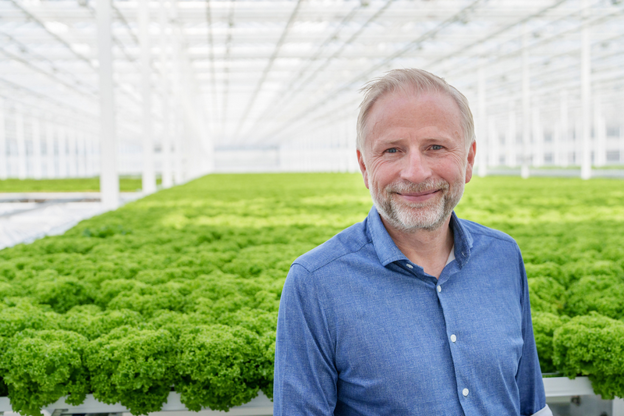
Mads Ulrich
Challenges for outdoor crop growers
After successfully expanding his business with tomatoes, cucumbers, peppers, and cannabis, Mads Pedersen decided to venture into lettuce cultivation in Europe, a decision driven by the escalating challenges faced by outdoor crop growers, particularly in Southern Europe. Issues like water scarcity in Spain and the rising threat of Fusarium have made outdoor lettuce production increasingly precarious. To ensure a steady lettuce supply, retailers are looking for alternative solutions.
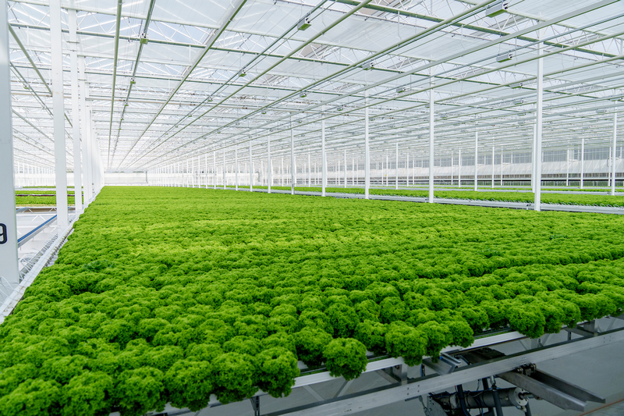
Mads explains that Nordic Greens saw opportunities in cultivating "teen leaf" varieties, a segment largely unexplored in Europe, opening up a new market segment for the greenhouse company.
"We do produce a few heads, but our main product is teen leaf, which is a new segment for the European market. It's a cross between romaine and iceberg, offering a sweeter and crunchier taste compared to the standard market offerings. While we primarily connect with retailers for our other vegetables, we now expect to sell half of our production to the food service sector, for which we have established a dedicated team."
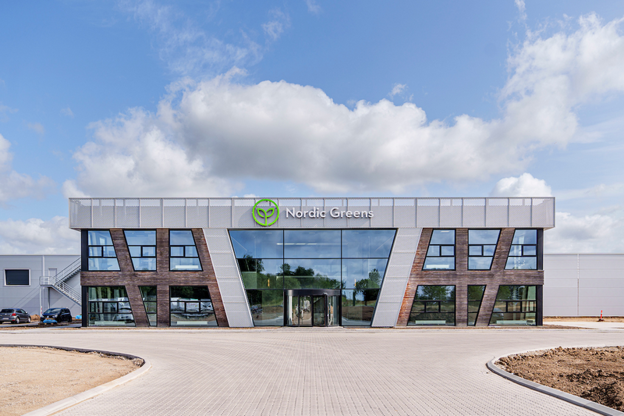
The new office, plus the huge facility in the back
The lettuce primarily goes to Denmark and Sweden, although further export is possible thanks to the prolonged shelf life. However, their mission extends beyond simply growing and exporting lettuce. "We aimed to create a truly sustainable system," emphasizes Mads. "We grow everything using our own solar panels, with a strong focus on producing high-quality lettuce with minimal environmental impact."
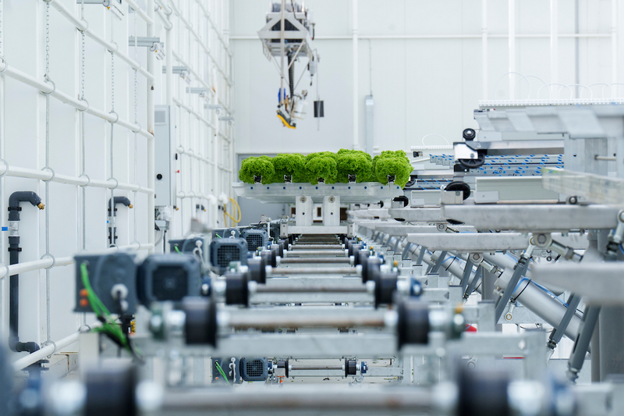
Advanced automation
One of the key innovations in Nordic Greens' lettuce facility is its advanced, automation. From seeding to packaging, every step in the production process is fully automated, reducing the need for human intervention.
Despite several systems available on the market, the Nordic Greens team opted to develop their own system. "We can't reveal all the details, but our system is more effective and sustainable," reveals Mads. "We use less peat, optimize water usage, and minimize space requirements, all while keeping environmental impact low."
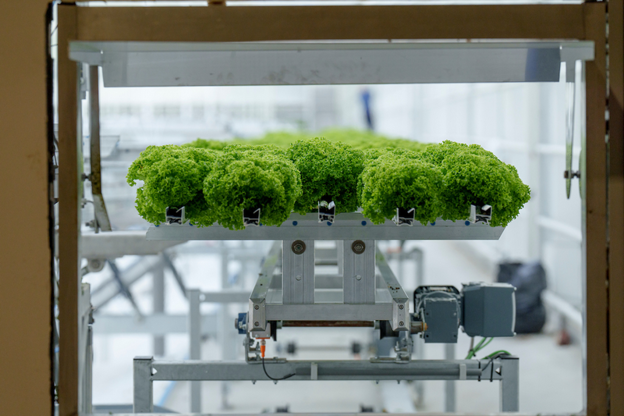
Setting up the facility presented significant challenges. "It's an entirely new system, with inputs from 10 international suppliers. Given the number of new machines that need to work together for the first time, coordination was crucial to ensure it all functions as designed," he explains. He underscores that the setup is vastly different from a tomato or cannabis facility. "If one machine doesn't work correctly, it affects the entire operation. Running a lettuce greenhouse is much more akin to setting up a factory, I would say."
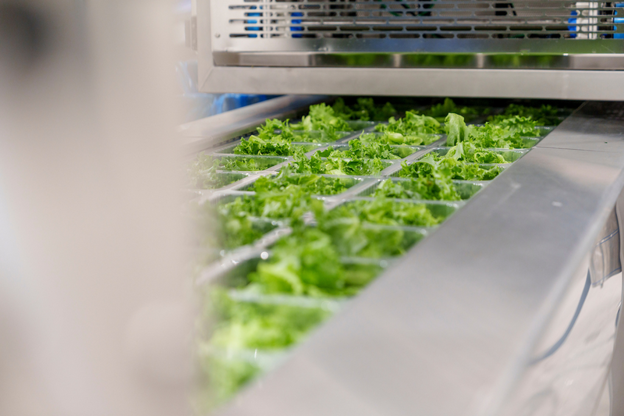
Cameras for crop monitoring
Incorporating AI into the system, Nordic Greens utilizes cameras to monitor crops, identify pests, diseases, and deficiencies, and gather data on crop growth and yield predictions. This data is then used to fine-tune the growing strategy. "Compared to the many variables affecting cucumber or tomato growing, a lettuce crop is very consistent, making it easier to implement AI into the growing strategy."
Other technologies include a fully dimmable and adaptable LED installation, powered by solar panels, which allows the growing team to adjust various spectrums throughout the plant's life cycle. "It's like creating the right fertilizer recipe: you want the plant to benefit from the ideal recipe for each growth phase."
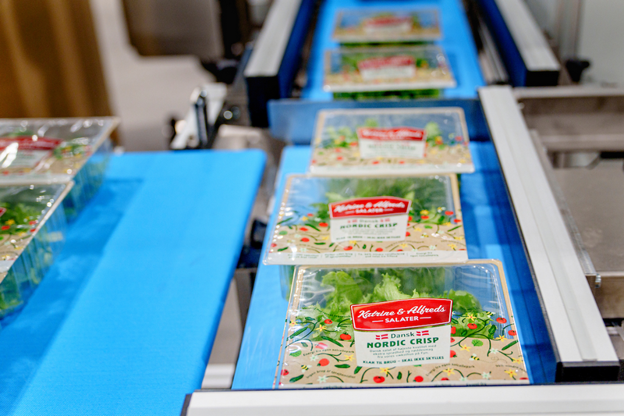
Grower in the driver’s seat
So, what's the role of the grower with all this technology in place? Well, there's still an important role for the grower, Mads laughs. "People can learn how to operate a system, but to be efficient and profitable, you also need to pay attention to the details and understand how to cultivate. We've seen this in the vertical farming world: even though a system is automated, you still need to be a skilled grower. It's like buying a Red Bull race car, but without Max Verstappen to drive it, you may not win."
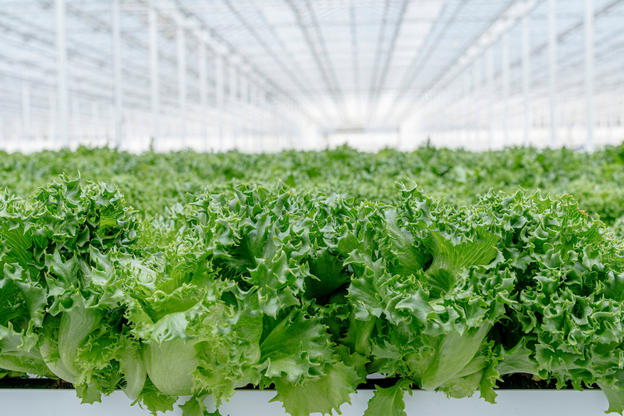
Mads has already received many requests for this system and is currently exploring a concept to make it available to other growers as well, as it can be applied anywhere in the world. "We're considering potential partnerships to implement this concept. There's a lot of interest because it can be adapted to various climatic conditions. In the Middle East, for example, we would only need to install additional cooling," he cites as an example.
"The system, however, would remain the same. We've created a vertical concept within a greenhouse: fully automated, incorporating the best of the hypermodern factory, whilst benefiting from natural sunlight.”
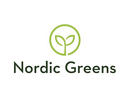 For more information:
For more information:
Mads Ulrik Pedersen, CEO
Nordic Greens
217 Assensvej, 5250
Odense, Denmark
Tel.: +45 659 62 927
info@nordicgreens.dk
www.nordicgreens.dk
